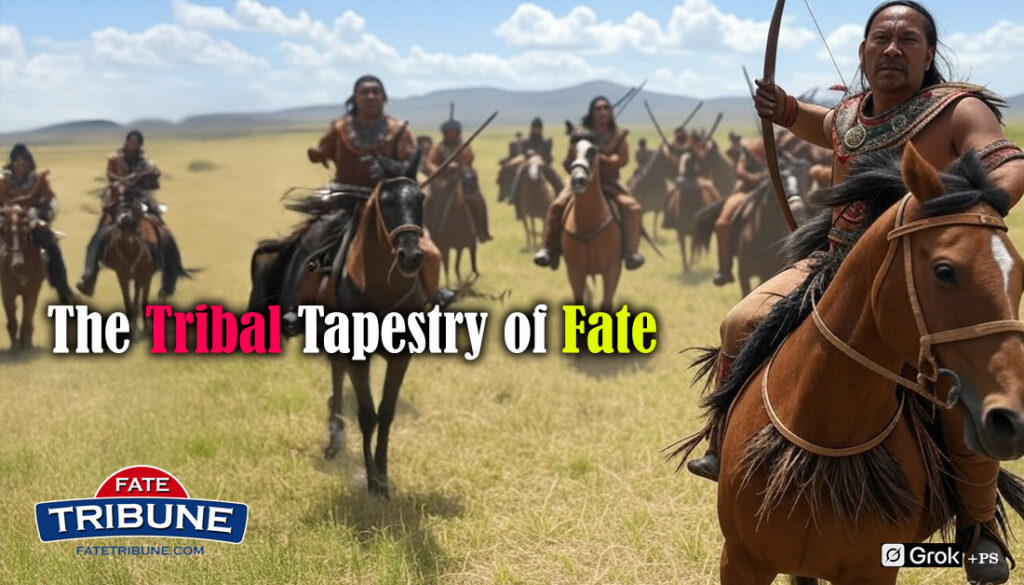Fate, TX — In the rapidly growing town of Fate, Texas, a microcosm of American political life unfolds, revealing a truth as old as human society: politics is tribal. Beneath the surface of city council meetings, zoning debates, and campaign signs sprouting like bluebonnets, Fate’s political landscape is a vibrant, fractious tapestry of tribes, sub-tribes, and secret cabals, each vying for influence. Here, loyalty to one’s tribe—be it a council faction, a political party, or the omnipresent anti-apartment coalition—shapes every decision, often at the expense of unity. As a constitutional conservative, I see in Fate a reflection of the broader struggle to preserve principle amid the clamor of competing loyalties.
At the heart of Fate’s political ecosystem sits the City Council, a tribe unto itself. This small band of elected officials, tasked with steering a town ballooning past 20,000 residents, operates as a microcosm of governance. Each council member commands their own tribe of supporters—voters who propelled them to office based on promises of low taxes, controlled growth, or infrastructure improvements. These constituent tribes are fickle, growing or shrinking based on a council member’s fidelity to campaign pledges and their skill in forging coalitions. A council member who champions a new park might swell their tribe’s ranks, while one perceived as cozy with developers risks defections.
Yet the council is no monolith. The Fate Municipal Development District (MDD), a sub-tribe appointed by the council, exerts significant sway over the town’s economic trajectory. Recently, the MDD finalized agreements for the Lafayette Crossing and “Project Cactus” developments, committing $15 million in future tax revenue to reimburse developers for infrastructure costs. This deal, aimed at spurring a massive retail hub, has ignited fierce debate, particularly among the anti-multi-family housing tribe—a dominant coalition of homeowners, retirees, and longtime residents. United in their opposition to high-density projects like the 1,300 apartments proposed in Lafayette Crossing, they fear such developments threaten Fate’s small-town ethos.
Fate’s tribal map grows more intricate with the city employee tribes. The administrative staff, a tribe of bureaucrats managing budgets and policies, works alongside the Department of Public Safety (DPS), the police and fire personnel who embody Fate’s commitment to security. DPS extends its tribal bonds to citizens, who rally behind first responders at parades and fundraisers. However, citizen tribes have clashed over DPS support: one faction demands unwavering backing, while another seeks cost-effective alternatives to fund a new police station, resisting a $20 million bond that would burden taxpayers. These tribes, though distinct, overlap: an employee might cheer for DPS at a council meeting while privately aligning with a council member’s faction.
Political affiliation adds another layer. Fate leans heavily Republican—roughly 70%—reflecting the conservative bent of Rockwall County. Yet the Democrat tribe, though smaller, is vocal, often aligning with progressive causes like “Strong Towns”. Within these partisan tribes, sub-factions emerge: Republicans split between establishment types and populist firebrands, while Democrats range from moderates to activists pushing urban-style policies. Tribal loyalties blur further when personal affiliations—church groups, HOAs, or even book clubs—pull individuals in conflicting directions.
Conflict is the lifeblood of Fate’s tribal politics. It erupts within tribes, as when a council member’s supporters fracture over a vote to fund a DPS bond. It flares between tribes, like when the Planning and Zoning Commission greenlights a project that the anti-apartment tribe deems heretical. Most poignantly, it torments individuals caught between tribes. Picture a conservative voter, loyal to a Republican council member, who also belongs to the anti-apartment tribe. If their council member backs a multi-family project to attract business, that voter faces a crisis of allegiance: party or principle?
Then there are the shadow tribes. Secret cabals—informal gatherings at coffee shops or closed-door strategy sessions—plot to sway council votes or oust rivals. These groups, often led by a Council Sub-Tribe, operate in whispers, their existence known but rarely acknowledged. Equally potent are the silent tribes, amorphous blocs of voters who may not even recognize their tribal bond. These residents, swayed by yard signs or a candidate’s handshake at the Forward Fate Festival, vote based on gut-level perceptions of trustworthiness or alignment with their values.
Amid Fate’s tribal fray, a vocal tribe opposes the Fate Tribune, waging a relentless campaign to discredit its reporting. This group, often aligned with entrenched council factions or development interests, dismisses the paper’s stories as biased, accusing it of stoking division. Conversely, a larger, steadfast tribe champions the Tribune, viewing it as a bulwark against corruption. Confident in the paper’s ability to expose backroom deals and tribal overreach, these supporters—ranging from watchdog citizens to principled conservatives—rely on its investigative lens to hold Fate’s power structures accountable.
The anti-multi-family housing tribe towers above all. Born of a shared dread that apartments will bring traffic, crime, or declining property values, this tribe transcends party lines, uniting Republicans and Democrats, newcomers and old-timers. Its influence is seismic: council candidates court its favor, and zoning decisions are scrutinized through its lens. In 2024, the Lafayette Crossing Development sparked a firestorm, with packed council meetings and petitions circulating like wildfire. The tribe fought fiercely, packing the council meeting, but the Lafayette Crossing project was approved by the Council Tribe, despite overwhelming opposition from the anti-multi-family housing citizen tribe. This decision deepened divisions, which led to the replacement of two council members, and is set to replace two more, plus the Mayor, in the election this May.
This tribalism, while vibrant, frays Fate’s social fabric. The Constitution’s call for ordered liberty—government by consent, tempered by reason—struggles against the raw passions of tribal loyalty. When council members prioritize their own agenda over the common good, the deliberative process suffers. Yet tribes also empower citizens, giving voice to those who might otherwise be ignored. The challenge for Fate, as for America, is balancing tribal zeal with a commitment to principle.
For those eager to delve deeper into Fate’s tribal dynamics, several works illuminate the forces at play. Amy Chua’s, “Political Tribes“ reveals how group identities drive conflict, from small towns to nations. Michael Morris’s, “Tribal“ offers a hopeful guide to harnessing our tribal instincts for good, rooted in psychology. Timothy J. Redmond’s, “Political Tribalism in America“ provides practical tools to restore reasoned debate. These books, grounded in principle, offer wisdom for navigating Fate’s fractured landscape.
As Fate grows, its tribal dynamics will only intensify. Newcomers will form their own tribes, challenging the old guard. Developers, an external tribe with deep pockets, will press for influence, testing the anti-apartment coalition’s resolve. Through it all, Fate’s leaders must navigate this fractal web of loyalties, striving to govern not for one tribe, but for all. In this small Texas town, the stakes feel local, but the lesson is universal: in politics, tribes are inevitable, but wisdom lies in rising above them.
**This post contains affiliate links that will reward the Fate Tribune with a small commission when items are purchased on Amazon.

